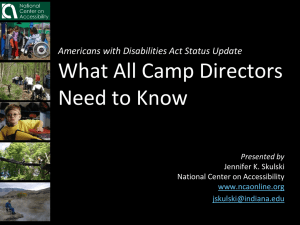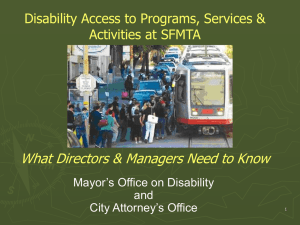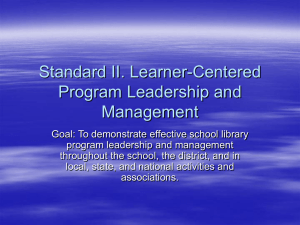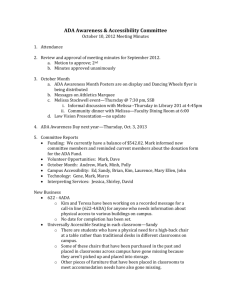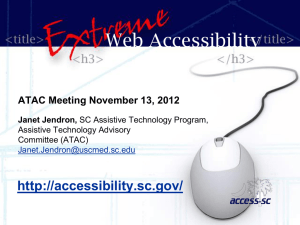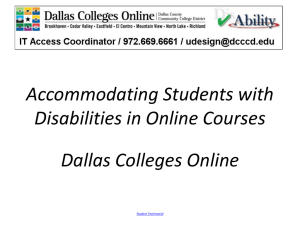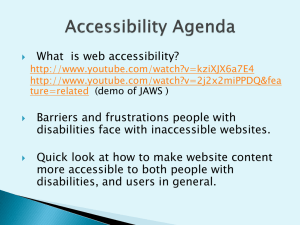A Guide to Accessible Programming
advertisement
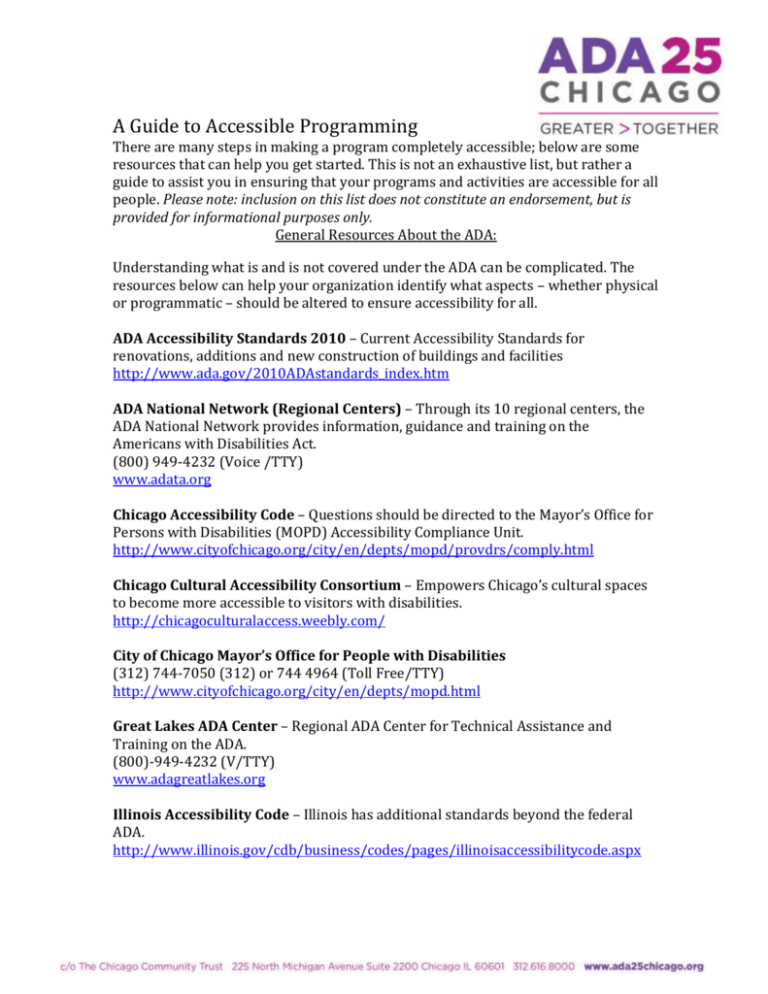
A Guide to Accessible Programming There are many steps in making a program completely accessible; below are some resources that can help you get started. This is not an exhaustive list, but rather a guide to assist you in ensuring that your programs and activities are accessible for all people. Please note: inclusion on this list does not constitute an endorsement, but is provided for informational purposes only. General Resources About the ADA: Understanding what is and is not covered under the ADA can be complicated. The resources below can help your organization identify what aspects – whether physical or programmatic – should be altered to ensure accessibility for all. ADA Accessibility Standards 2010 – Current Accessibility Standards for renovations, additions and new construction of buildings and facilities http://www.ada.gov/2010ADAstandards_index.htm ADA National Network (Regional Centers) – Through its 10 regional centers, the ADA National Network provides information, guidance and training on the Americans with Disabilities Act. (800) 949-4232 (Voice /TTY) www.adata.org Chicago Accessibility Code – Questions should be directed to the Mayor’s Office for Persons with Disabilities (MOPD) Accessibility Compliance Unit. http://www.cityofchicago.org/city/en/depts/mopd/provdrs/comply.html Chicago Cultural Accessibility Consortium – Empowers Chicago’s cultural spaces to become more accessible to visitors with disabilities. http://chicagoculturalaccess.weebly.com/ City of Chicago Mayor’s Office for People with Disabilities (312) 744-7050 (312) or 744 4964 (Toll Free/TTY) http://www.cityofchicago.org/city/en/depts/mopd.html Great Lakes ADA Center – Regional ADA Center for Technical Assistance and Training on the ADA. (800)-949-4232 (V/TTY) www.adagreatlakes.org Illinois Accessibility Code – Illinois has additional standards beyond the federal ADA. http://www.illinois.gov/cdb/business/codes/pages/illinoisaccessibilitycode.aspx The Chicago Community Trust – “Renewing the Commitment” An ADA Compliance Guide for Nonprofits http://www.cct.org/wpcontent/uploads/2015/05/RenewingADACommitment_0211.pdf Title III (Privately owned and operated programs and services) – Nondiscrimination on the basis of disability by public accommodations and in commercial facilities http://www.ada.gov/regs2010/titleIII_2010/titleIII_2010_regulations.pdf U.S. Access Board – A federal agency that promotes equality for people with disabilities through leadership in accessible design and the development of accessibility guidelines and standards (800) 872-2253 (Voice), (800) 993-2822 (TTY) www.access-board.gov U.S. Department of Justice, Disability Rights Division (800) 514-0301 (Voice), (800) 514-0383 (TTY) www.ada.gov Accessibility at Your Cultural Organization: In addition to the general resources listed above, there are a number of useful resources specific to the accessibility of cultural organizations. Bodies of Work – A network of artists and organizations whose art illuminates the disability experience. – http://www.ahs.uic.edu/dhd/bodiesofwork/ Design for Accessibility: A Cultural Administrators Handbook http://arts.gov/publications/design-accessibility-cultural-administrators-handbook Listen Tech- makes iDSP, a new generation of personal listening products that can be used in various places where it’s difficult to hear, like: theaters, lecture halls, concert venues, houses of worship, and more. 1-800-330-0891 or 1-801-233-8992 http://www.listentech.com/ The Kennedy Center – One of the leading experts in accessibility with many tip sheets and resources. See below for a full listing of resource topics. http://www.kennedy-center.org/accessibility/education/lead/resources.html Tip Sheets: • The Color Red in Design • Captioning and CART • Large Print Programs 2 • Radio Frequency, Induction Loop, and Infrared Assistive Listening Systems • Producing and Distributing Braille and Large Print Programs • Service Animals and the Revised ADA Regulations • Staff Training Resources • Universal Design Resources on the Web • Universal Principles of Online Accessible Ticketing • The Impact of the 2010 Regulations on Hold and Release Policies for Wheelchair Accessible Seating Books and Brochures: • Assistive Listening Devices for People with Hearing Loss – A Guide for Performing Arts Settings • Audio Description for People with Vision Loss – A Guide for Performing Arts Settings • Sensory Friendly Programming for People with Social & Cognitive Learning Disabilities Website Accessibility: An organization’s website is one of the first places patrons visit for information and it is vital that your website is accessible to all audiences. Below are some guidelines and a resource to help evaluate the accessibility of your site. Knowbility – Organization that has done a lot of work with the Arts/Culture Community regarding Web Accessibility and performs web accessibility evaluations http://www.knowbility.org/ Section 508 Web Accessibility Standards http://www.access-board.gov/guidelines-and-standards/communications-andit/about-the-section-508-standards/section-508-standards U.S. DOJ Fact Sheet on Web Accessibility for Local and State Governments http://www.ada.gov/websites2.htm Accessible and Effective Communication: People who have vision, hearing or speech disabilities (“communication disabilities”) use different ways to communicate. To ensure all people can enjoy performances, screenings, panels and other experiences, there are a number of accommodations organizations can make to improve communication. The most standard are: American Sign Language Interpreters Captioning for videos Communications Access in Real-time Translation (CART) Audio Description Touch Tours 3 View a general fact sheet about different types of communications here: http://www.ada.gov/effective-comm.htm Audio Description Associates, LLC. – Audio Description provides access to the visual elements – action, costumes, settings, gestures, facial expressions and other visually engaging images – of television/film, museum exhibitions, theater and a variety of events. (301) 920-0218 http://www.audiodescribe.com/ Chicago Hearing Society – Empowers deaf, hard of hearing and hearing people to communicate and collaborate by providing an array of services including interpreter and CART services. (773) 248-9121 http://www.chicagohearingsociety.org/ Efficiency Reporting – CART and Captioning (630) 682-8887 http://www.efficiencyreporting.com/ Wilde Mouth – Chicago-based professional Voice Actor and Audio Describer for ensuring performances and screenings are accessible to X and Y. (773) 895-5691 http://wildemouth.com/ Training Resources: Great Lakes ADA Center – Regional ADA Center for Technical Assistance and Training on the ADA 800-949-4232 (V/TTY) www.adagreatlakes.org JJ’s List – Communications and marketing social enterprise that helps businesses incorporate disability-aware marketing, customer services and employment best practices into core business strategies. (847) 869-0000 http://www.jjslist.com/ Open Doors Organization – Makes goods and services accessible to people with disabilities in the travel and tourism industry. (773) 388-8839 www.opendoorsnfp.org Contributing Organizations: ADA 25 Chicago and the Chicago Cultural Accessibility Consortium www.ada25chicago.org 4

